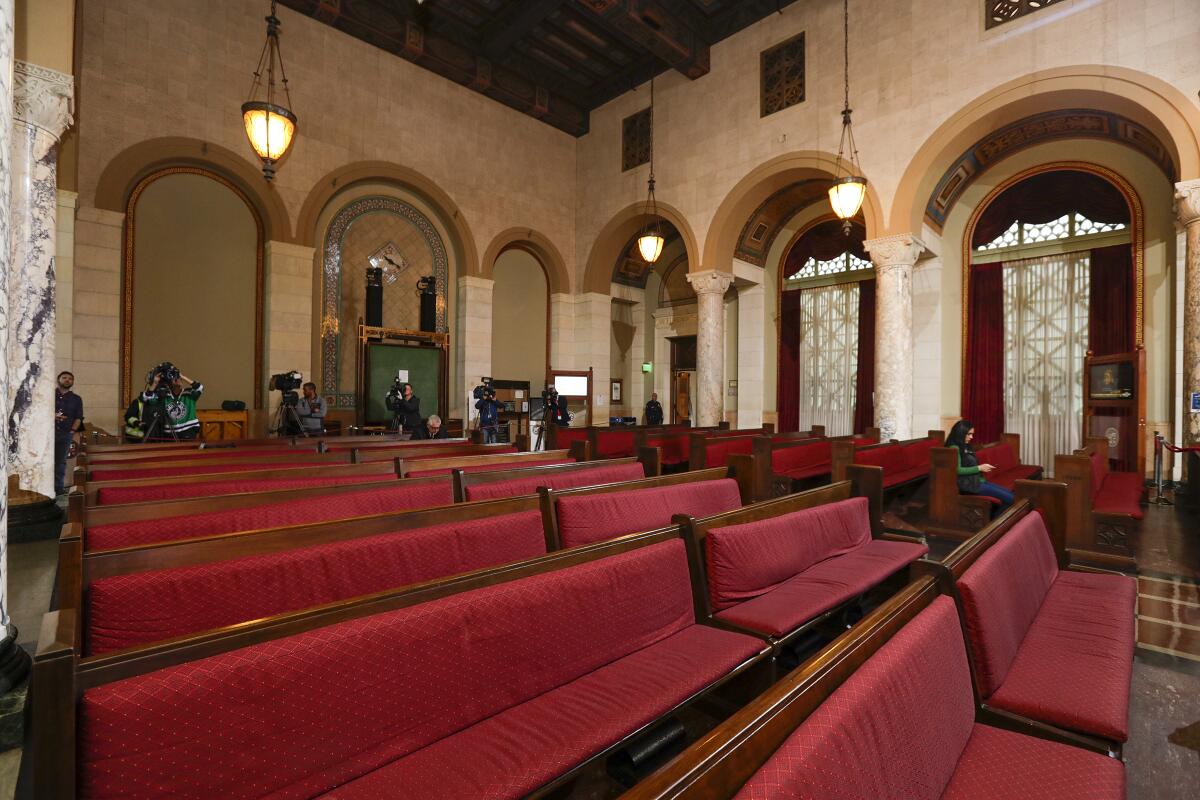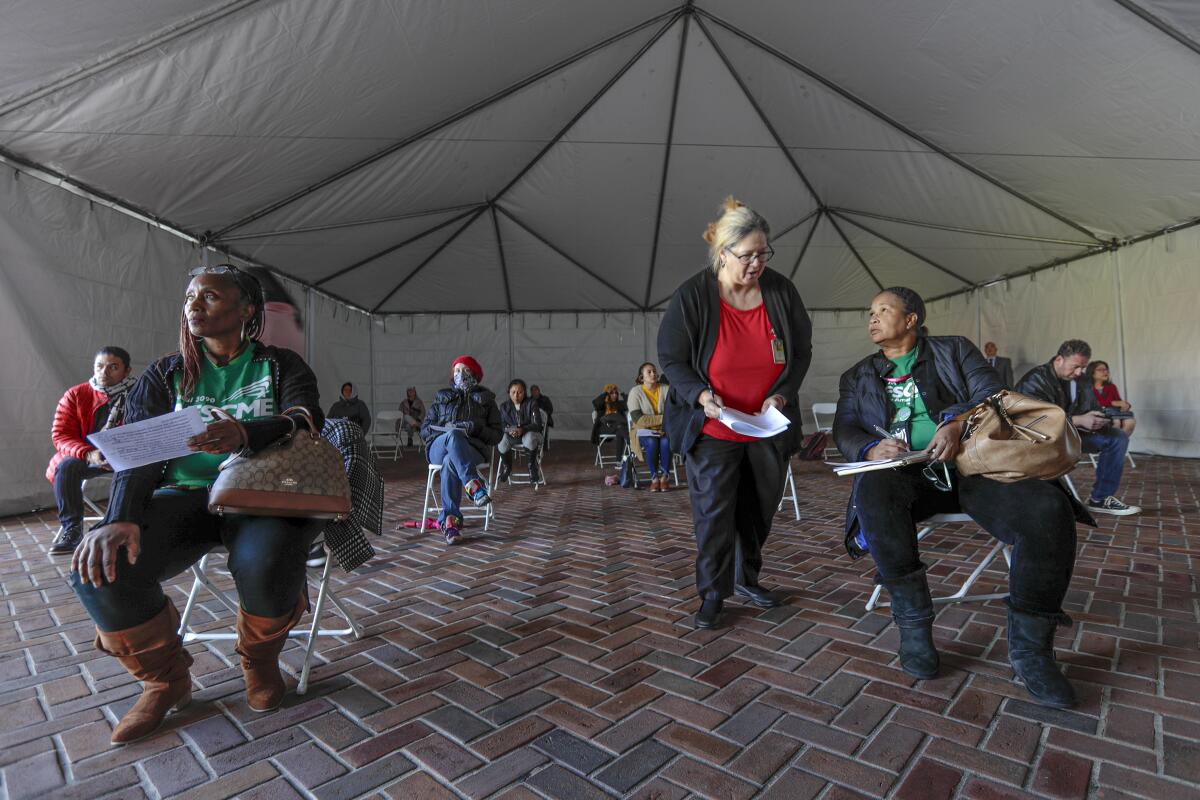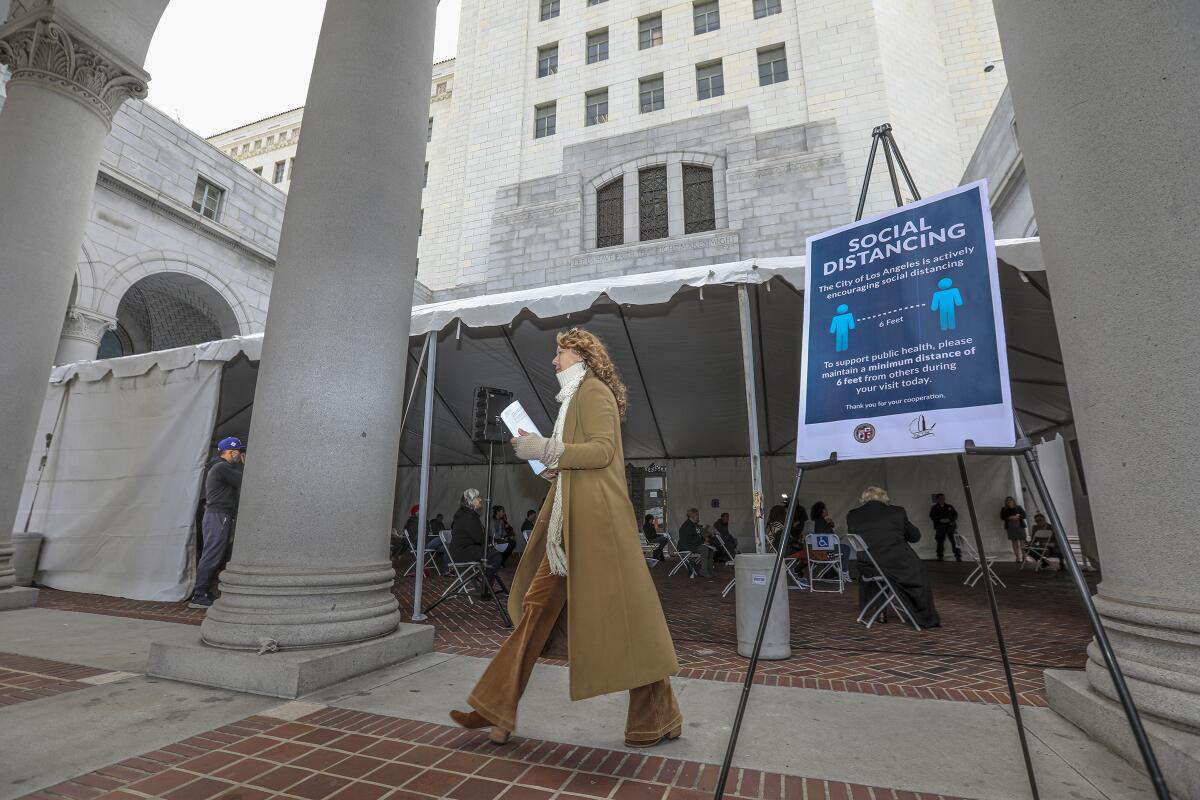L.A. could boost sick leave, aid businesses, guarantee rights to laid off workers

- Share via
The Los Angeles City Council pushed forward dozens of proposals Tuesday meant to help Angelenos cope with the spread of coronavirus and protect them from its effects, including plans to boost sick leave, enshrine recall rights for workers who are laid off, and provide financial assistance to struggling businesses and tenants.
“This pandemic has touched every corner of the world, and it is increasing at a global scale like we’ve never seen before,” City Council President Nury Martinez said at the beginning of a marathon meeting that lasted into the early evening. “We are in uncharted waters, and it is up to us to make sure we are doing our duty as public servants.”
Martinez asked city staffers to report back on creating an emergency program that would provide at least 14 days of paid sick leave to Angelenos during a public health crisis or major disaster. Los Angeles already requires sick leave for employees working in the city, ensuring that they can accrue and use up to 48 hours of paid leave — six days — per year.
The move is meant to prevent people who have fallen ill from continuing to go to work during the coronavirus pandemic, putting more people at risk of infection. As of Tuesday afternoon, more than 470 people had been confirmed to have contracted COVID-19 in California, leading to 12 deaths in the state.
The crisis has thrown a spotlight on the vast differences in the benefits available to employees depending on where they live and for whom they work. The council voted unanimously to back Martinez’s proposal to boost sick leave, directing city staffers to come up with recommendations that would come back for their approval.

It was one of dozens of new proposals that council members introduced Tuesday in reaction to the COVID-19 pandemic: Los Angeles also moved to loosen a city rule to help homeless people endure the crisis, temporarily allowing tents to stay up during the day. Several council members also proposed an eviction moratorium that could be tighter than that announced by Mayor Eric Garcetti, which must return to the council for final approval.
Council members also introduced new proposals to set up loans and grants for businesses affected by the pandemic and to explore other business assistance such as easing taxes and fees. Early in the meeting, restaurant owner Tricia La Belle addressed the council and said that the shutdown of dine-in service had put her in financial jeopardy.
“I can’t breathe at this moment. My staff is terrified. They’re calling me every day, asking me for money that I can’t provide because there is no income coming into my restaurant,” La Belle said, complaining that many customers were too afraid even to order delivery.
“We’re on the verge of anarchy and putting more people on our streets,” La Belle said. “Please help us.”
One proposal would create a “just cause termination” law that would ensure that any workers who were laid off for economic reasons are discharged in the order of seniority. They would also have recall rights based on seniority. Employers would be barred from permanently terminating workers — banning them from being recalled — without just cause.
Council members also called for more hygiene stations with hand sanitizer on the Metro system, asked staffers to scout for city buildings or lots that could be used as testing sites, and proposed 24-hour access to restrooms in public parks.
Another proposed measure, offered by Councilmen Curren Price and Herb Wesson, would require grocery stores and food delivery services to give their employees time to wash their hands every half hour and ensure that there is free testing for the virus for those employees.
In addition, Councilwoman Monica Rodriguez called for cracking down on street vendors who don’t have health permits selling food. Rodriguez had initially floated a temporary moratorium on all street vending, arguing that it would help protect Angelenos from crowds surrounding vendors during the pandemic, but adjusted her proposal during the meeting.
Council members put forward the new measures and proposals at a Tuesday meeting that was shaped by special efforts to try to ensure social distancing between attendees. The council has pared down the number of meetings scheduled in coming weeks and imposed new measures to limit the number of people gathered in the council chamber.

Martinez had urged Angelenos to watch the meeting remotely on television or streaming video and submit comments electronically. Members of the public were not allowed inside the council chambers, but a tent was erected outside City Hall with a microphone for people who wanted to address the council in person.
Several speakers complained about the setup, arguing it was unfair to the public.
“Keeping the public outside of a public meeting in 52-degree weather with no heaters and no bathrooms is not a pandemic response, it’s oppression!” Sabrina Johnson, a member of the homeless advocacy group KTown for All, told the council from under the tent on Tuesday.
Doug Haines, who sits on two neighborhood councils in Hollywood, was among the people who waited outside City Hall in the chilly weather to speak Tuesday, sitting on plastic chairs that were placed roughly six feet apart.
Haines said he wanted the city to suspend the approval of all real estate development projects that do not otherwise require a city hearing until all neighborhood councils are permitted to meet again and review them.
“I’m afraid we are going to get a wave of approvals without public comment,” Haines said.
Times staff writers Brittny Mejia and Liam Dillon contributed to this report.
More to Read
Sign up for Essential California
The most important California stories and recommendations in your inbox every morning.
You may occasionally receive promotional content from the Los Angeles Times.













